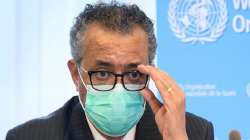Omicron variant less severe, but remains dangerous for those unvaccinated: WHO chief
"While Omicron causes less severe disease than Delta, it remains a dangerous virus, particularly for those who are unvaccinated," Tedros said during a media briefing on COVID.

The Omicron variant of COVID-19 is a "dangerous virus" particularly for those who are unvaccinated, World Health Organization (WHO) director-general Tedros Adhanom Ghebreyesus said on Wednesday.
"While Omicron causes less severe disease than Delta, it remains a dangerous virus, particularly for those who are unvaccinated," Tedros said during a media briefing on COVID-19.
This huge spike in infections is being driven by the Omicron variant, which is rapidly replacing Delta in almost all countries, he said. WHO chief also highlighted Africa's COVID-19 vaccination rate and said "in Africa, more than 85 per cent of people are yet to receive a single dose of vaccine. We cannot end the acute phase of the pandemic unless we close this gap."
"We are making progress. In December, COVAX shipped more than double the number of doses it shipped in November, and in the coming days, we expect COVAX to ship its 1 billionth vaccine dose," he stated.
ALSO READ: Omicron Scare: How symptoms of COVID-19 changed over the three waves
He further stated that some of the supply constraints we faced last year are now starting to ease, but we still have a long way to go to reach our target of vaccinating 70 per cent of the population of every country by the middle of this year.
90 countries have still not reached the 40 per cent target, and 36 of those countries have vaccinated less than 10 per cent of their populations, he added.
"WHO and our partners are actively supporting these countries to overcome the bottlenecks they face, in leadership and coordination, lack of supply visibility, short shelf-life of donated vaccines, limited cold chain capacity, vaccine confidence, health worker shortages, and competing priorities," he added.
ALSO READ: Covaxin booster dose neutralises Omicron, as well as Delta variants, says Bharat Biotech